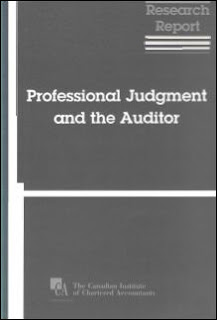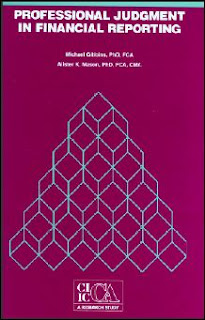Because they are viewed as principles-based, International Financial Reporting Standards (IFRS) raise pervasive judgment issues (such as going concern, materiality and related disclosures) and application judgment issues (including presentation and disclosure, classification, recognition, de-recognition and measurement) for financial statement preparers, auditors and regulators. In fact, the need to exercise sound professional judgment on a continuous basis (perhaps 100,000 times a day around the world) was noted by Robert P. Garnett Chairman, International Financial Reporting Interpretations Committee (IFRIC) in a YouTube presentation called “Professional judgment gets used in the interpretation of standards” on November 29, 2008.
Thursday, July 28, 2011
Professional Judgment and Principles-based International Financial Reporting Standards
In a Statement before the Subcommittee on Securities, Insurance and Investment of the United States Senate in Washington, D.C. (October 24, 2007, p. 10), Sir David Tweedie, Chairman of the International Accounting Standards Board (IASB), emphasized that a shift to less rules-based principles will increase the need for judgment. He stated: “A principle-based standard relies on judgments. Disclosure of the choices made and the rationale for these choices would be essential. If in doubt about how to deal with a particular issue, preparers and auditors should relate back to the core principles. The basis for conclusions (the rationale underlying a particular standard and published with it) should also include, in particular, the question of whether there is only a single view to tackle the economics of the situation. Often there are competing views—is one regarded as more relevant? If so, the reasons for choosing that particular view should be explained in the basis for conclusions and the reasons for rejecting the others clearly outlined.”
Because they are viewed as principles-based, International Financial Reporting Standards (IFRS) raise pervasive judgment issues (such as going concern, materiality and related disclosures) and application judgment issues (including presentation and disclosure, classification, recognition, de-recognition and measurement) for financial statement preparers, auditors and regulators. In fact, the need to exercise sound professional judgment on a continuous basis (perhaps 100,000 times a day around the world) was noted by Robert P. Garnett Chairman, International Financial Reporting Interpretations Committee (IFRIC) in a YouTube presentation called “Professional judgment gets used in the interpretation of standards” on November 29, 2008.
Because they are viewed as principles-based, International Financial Reporting Standards (IFRS) raise pervasive judgment issues (such as going concern, materiality and related disclosures) and application judgment issues (including presentation and disclosure, classification, recognition, de-recognition and measurement) for financial statement preparers, auditors and regulators. In fact, the need to exercise sound professional judgment on a continuous basis (perhaps 100,000 times a day around the world) was noted by Robert P. Garnett Chairman, International Financial Reporting Interpretations Committee (IFRIC) in a YouTube presentation called “Professional judgment gets used in the interpretation of standards” on November 29, 2008.
Wednesday, July 20, 2011
The Role of Ethics in Professional Judgment
The International Federation of Accountants (IFAC) comprises 159 members and associates in 124 countries worldwide, representing approximately 2.5 million accountants in public practice, industry and commerce, the public sector and education. IFAC’s mission is to serve the public interest, strengthen the worldwide accountancy profession and contribute to the development of strong international economies by establishing and promoting adherence to high quality professional standards, furthering the international convergence of such standards and speaking out on public interest issues where the profession’s expertise is most relevant.
IFAC published the Handbook of the Code of Ethics for Professional Accountants (Code of Ethics) in 2010. Prepared by the International Ethics Standards Board of Accountants (IESBA), the Code of Ethics became effective on January 1, 2011. It contains three parts. Part A establishes the fundamental principles of professional ethics for professional accountants and provides a conceptual framework that professional accountants shall apply. It states (on page 9): “A professional accountant shall use professional judgment in applying this conceptual framework.”
Parts B and C describe how the conceptual framework applies in certain situations. They provide examples of safeguards that may be appropriate to address threats to compliance with the fundamental principles. They also describe situations where safeguards are not available to address the threats and, consequently, the circumstance or relationship creating the threats shall be avoided. Part B applies to professional accountants in public practice. Part C applies to professional accountants in business. Professional accountants in public practice may also find Part C relevant to their particular circumstances.
According to the Code of Ethics (page 10), the fundamental principles of professional ethics include integrity, objectivity, professional competence and due care, confidentiality and professional behaviour. Each of these principles is discussed in detail, for example, objectivity is “to not allow bias, conflict of interest or undue influence of others to override professional or business judgments.” In this case, the Code of Ethics (page 16) states: “A professional accountant may be exposed to situations that may impair objectivity. It is impracticable to define and prescribe all such situations. A professional accountant shall not perform a professional service if a circumstance or relationship biases or unduly influences the accountant’s professional judgment [emphasis added] with respect to that service.”
Labels:
accounting standards,
auditing,
business,
competence,
conceptual framework,
confidentiality,
due care,
ethics,
IFAC,
integrity,
objectivity,
professional judgment,
public practice
Wednesday, July 13, 2011
Professional Judgment in Auditing
The Canadian Institute of Chartered Accountants (CICA) published the research report Professional Judgment and the Auditor in 1995. The 100-page report was prepared by staff of the CICA Research Studies Department (J. Paul-Emile Roy, CA) under the direction of an 8-member study group. It establishes the importance of professional judgment to auditing standards through an examination of the prevalence of references to professional judgment in the CICA Handbook. On page 5, the report proposes a definition of professional judgment in auditing that is a more concise and condensed version of the definition proposed in the 1988 CICA research study Professional Judgment in Financial Reporting.
According to the report: “Professional judgment in auditing is the application of relevant knowledge and experience, within the context provided by auditing and accounting standards and Rules of Professional Conduct, in reaching decisions where a choice must be made between alternative possible courses of actions.” This definition is helpful in that it clarifies the situations where professional judgment is called for and emphasizes the role of professional standards in the process.
The report identifies many sources of information regarding the issues surrounding professional judgment. It develops a framework for professional judgment and identifies key factors that influence the judgment process. As well, it provides valuable guidance to practitioners regarding their professional obligations when exercising professional judgment.
Wednesday, July 6, 2011
Professional Judgment in Financial Reporting
The Canadian Institute of Chartered Accountants (CICA) published the research study Professional Judgment in Financial Reporting in 1988. On pages 132-133 of the 225-page study, the co-authors (Michael Gibbins, PhD, FCA and Alister K. Mason, PhD, FCA) supported by a six-member advisory group, address matters regarding the exercise of professional judgment in financial reporting.
According to the authors, when professional judgment in the financial reporting context is referred to by standard-setters, securities commissions, educators, individual professionals and others, it should be defined as follows: “The process of reaching a decision on a financial reporting issue can be described as professional judgment when it is analytical, based on experience and knowledge (including knowledge of one's own limitations and of relevant standards), objective, prudent and carried out with integrity and recognition of responsibility to those affected by its consequences. Such professional judgment is likely to be most valuable in complex, ill-defined, or dynamic situations, especially where standards are incomplete, and should normally involve consultation with other knowledgeable people, identification of potential consequences and documentation of the analytical processes leading to the decision.”
In Chapters 12-14 of the study, the authors make 32 recommendations ─ about the nature of professional judgment, about standards and for those exercising professional judgment.
Subscribe to:
Posts (Atom)



